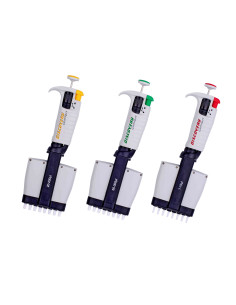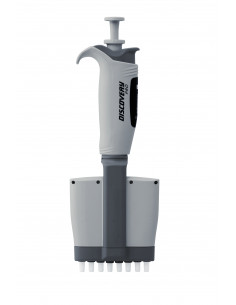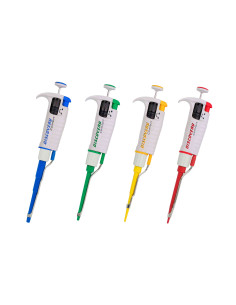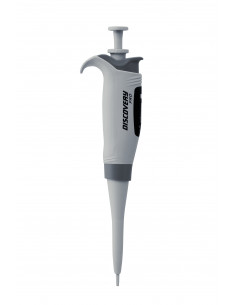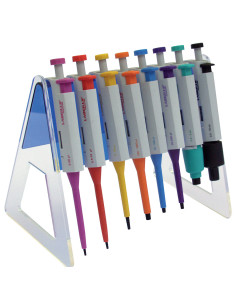MANUAL MICROPIPETTES
Manual Micropipettes
If you’re someone who prefers full control with every pipetting action, manual micropipettes are your best choice. Simple, effective, and reliable, these micropipettes have been the standard tool in laboratories around the world for decades.
At Pobel, we offer a selection of high-precision manual micropipettes—perfect for those who want to pipette without automation, but with maximum reliability. Keep reading to discover why they remain the preferred option for many professionals and how they differ from other models.
What is a Manual Micropipette and Why Choose One?
Manual micropipettes operate through a mechanically actuated plunger, allowing you to aspirate and dispense liquids with full manual control. They’re ideal for users who require precision but prefer a mechanism that doesn’t rely on batteries or electronics.
Advantages of Manual Micropipettes
-
Absolute reliability: No electronics to fail or require complex calibrations.
-
Total control: Manual volume adjustment and tactile feedback with every pipette.
-
More affordable: Typically less expensive than electronic models.
-
Extreme durability: Built to withstand years of intensive use.
-
Complete independence: No batteries or electrical charging needed.
If you’re looking for a precise, durable, and hassle-free micropipette, a manual one is your best option.
Differences Between Manual and Electronic Micropipettes
Manual micropipettes use a manual plunger mechanism, while electronic micropipettes automate the process using a motor. In terms of accuracy, both offer precise measurements, but electronic models improve repeatability and reduce user fatigue.
Electronic micropipettes require charging or batteries, whereas manual micropipettes can be used at any time without relying on a power source. Manual versions are also more cost-effective, while electronic ones tend to be more expensive.
If you’re looking for convenience and high precision for repetitive processes, an electronic micropipette may be ideal. But if you prefer reliability, manual control, and a more affordable price, a manual micropipette is the way to go.
What Are Manual Micropipettes Used For?
Manual micropipettes have a wide range of laboratory applications:
-
Scientific and Academic Research
Used in universities, research centers, and development labs for experiments where precision is key. -
Clinical and Hospital Laboratories
Essential for blood analysis, serological testing, and biomedical diagnostics requiring high accuracy. -
Chemical and Pharmaceutical Industry
From drug formulation to quality control testing, these micropipettes ensure reliable results. -
Microbiology and Biotechnology
Useful for handling cells, cultures, and reagents in procedures like PCR and molecular cloning.
If you need a reliable and accurate micropipette for individual lab tasks, manual micropipettes remain a safe and trusted choice.
How to Choose the Best Manual Micropipette
To find the right manual micropipette for your lab, consider the following:
-
Volume range: Choose a model that covers the volumes you work with most frequently.
-
Accuracy and calibration: Look for trusted brands with quality certifications.
-
Ergonomics: A comfortable design helps reduce fatigue during prolonged use.
-
Tip compatibility: Ensure the pipette is compatible with universal tips.
If you’re unsure which micropipette to choose, Pobel is here to offer expert guidance with no obligation.
Buy Manual Micropipettes from Pobel with Guaranteed Precision
At Pobel, we offer a high-quality selection of manual micropipettes designed for precision, durability, and comfort in every pipetting task. Contact us so we can help you find the right option for your needs.
Why Buy from Pobel?
-
Wide range of models: Find the perfect manual micropipette for your application.
-
Guaranteed quality: We work with the leading manufacturers in the industry.
-
Expert advice: We’ll help you choose the best option for your lab.
Explore our catalog and contact us to improve efficiency in your laboratory.
Frequently Asked Questions
Are manual micropipettes less accurate than electronic ones?
No, both offer high precision. However, electronic micropipettes may improve repeatability in high-volume pipetting.
How are manual micropipettes calibrated?
They should be calibrated every 3 to 6 months, depending on usage, using a precision balance.
Are they compatible with all types of tips?
It depends on the model, but most manual micropipettes are compatible with universal tips.




